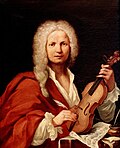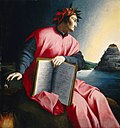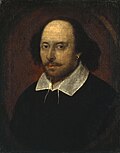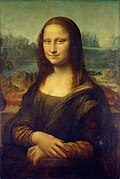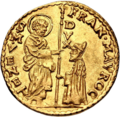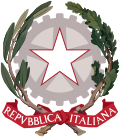The Italy portal
Italy Italian Republic , is a country in Southern and Western Europe. It consists of a peninsula that extends into the Mediterranean Sea , with the Alps on its northern land border, as well as nearly 800 islands , notably Sicily and Sardinia . Italy shares land borders with France to the west; Switzerland and Austria to the north; Slovenia to the east; and the two enclaves of Vatican City and San Marino . It is the tenth-largest country in Europe by area , covering 301,340 km2 (116,350 sq mi), and the third-most populous member state of the European Union , with nearly 60 million inhabitants. Italy's capital and largest city is Rome ; other major urban areas include Milan , Naples , Turin , Palermo , Bologna , Florence , Genoa , and Venice .
The history of Italy goes back to numerous Italic peoples —notably including the ancient Romans , who conquered the Mediterranean world during the Roman Republic and ruled it for centuries during the Roman Empire . With the spread of Christianity, Rome became the seat of the Catholic Church and the Papacy . Barbarian invasions and other factors led to the decline and fall of the Western Roman Empire between late antiquity and the Early Middle Ages . By the 11th century, Italian city-states and maritime republics expanded, bringing renewed prosperity through commerce and laying the groundwork for modern capitalism. The Italian Renaissance flourished during the 15th and 16th centuries and spread to the rest of Europe . Italian explorers discovered new routes to the Far East and the New World , contributing significantly to the Age of Discovery . (Full article...
Camillo Paolo Filippo Giulio Benso, Count of Cavour, Isolabella and Leri Italian: [kaˈmillo ˈbɛnso] Count of Cavour ( kə-VOOR Italian : Conte di Cavour [ˈkonte di kaˈvur] Cavour , was an Italian politician , statesman , businessman , economist , and noble , and a leading figure in the movement towards Italian unification . He was one of the leaders of the Historical Right and Prime Minister of the Kingdom of Sardinia from 1852, a position he maintained (except for a six-month resignation) until his death, throughout the Second Italian War of Independence and Giuseppe Garibaldi 's campaigns to unite Italy. After the declaration of a united Kingdom of Italy , Cavour took office as the first Prime Minister of Italy ; he died after only three months in office and did not live to see the Roman Question solved through the complete unification of the country after the Capture of Rome in 1870.
Cavour put forth several economic reforms in his native region of Piedmont , at that time part of the Kingdom of Sardinia, in his earlier years and founded the political newspaper Il Risorgimento Chamber of Deputies , he quickly rose in rank through the Piedmontese government, coming to dominate the Chamber of Deputies through a union of centre-left and centre-right politicians. After a large rail system expansion program, Cavour became prime minister in 1852. As prime minister, Cavour successfully negotiated Piedmont's way through the Crimean War , the Second Italian War of Independence , and Garibaldi's Expedition of the Thousand , managing to manoeuvre Piedmont diplomatically to become a new great power in Europe, controlling a nearly united Italy that was five times as large as Piedmont had been before he came to power. (Full article...
Category puzzle Select [►] to view subcategories
The following are images from various Italy-related articles on Wikipedia.
Image 1 Espresso is a coffee brewed by forcing a small amount of nearly boiling water under pressure through finely ground
coffee beans . The term
espresso comes from the Italian
esprimere , which means 'to express', and refers to the process by which hot water is forced under pressure through ground coffee. (from
Culture of Italy )
Image 2 Antonio Vivaldi , in 1723. His best-known work is a series of
violin concertos known as
The Four Seasons . (from
Culture of Italy )
Image 3 The
Altare della Patria in Rome, a
national symbol of Italy celebrating the first king of the unified country, and resting place of the
Italian Unknown Soldier since the end of World War I. It was inaugurated in 1911, on the occasion of the 50th
Anniversary of the Unification of Italy . (from
Culture of Italy )
Image 4 Dante Alighieri , one of the greatest poets of the
Middle Ages . His epic poem
The Divine Comedy ranks among the finest works of
world literature . (from
Culture of Italy )
Image 5 The statue of
Italia turrita in Naples.
Italia turrita is the
national personification of Italy. (from
Culture of Italy )
Image 6 The
Frecce Tricolori , with the smoke trail representing the
national colours of Italy , above the
Victor Emmanuel II Monument in Rome during the celebrations of the
Festa della Repubblica on 2 June 2022 (from
Culture of Italy )
Image 7 Alessandro Manzoni is famous for the novel
The Betrothed (1827), generally ranked among the masterpieces of world literature. (from
Culture of Italy )
Image 8 Regional seat of
RAI in Cosenza (from
Culture of Italy )
Image 9 Enrico Fermi , creator of the world's
first nuclear reactor . He is considered the "architect of the
nuclear age " and the "architect of the
atomic bomb ". (from
Culture of Italy )
Image 10 Cover of
Corriere dei Piccoli , 11 July 1911, with a strip in the Italian style (no speech bubbles). (from
Culture of Italy )
Image 11 The historic seat of the
Corriere della Sera in via Solferino in Milan (from
Culture of Italy )
Image 15 The ingredients of traditional
pizza Margherita —
tomatoes (red),
mozzarella (white), and
basil (green)—are held by popular legend to be inspired by the colours of the national
flag of Italy . (from
Culture of Italy )
Image 16 Folkloristic reconstruction of the
Company of Death led by
Alberto da Giussano who is preparing to carry out the
charge during the
battle of Legnano at the
Palio di Legnano 2014 (from
Culture of Italy )
Image 17 William Shakespeare is an example of an
Italophile of the 16th century. (from
Culture of Italy )
Image 19 Leonardo da Vinci 's
Mona Lisa is an Italian art masterpiece worldwide famous. (from
Culture of Italy )
Image 20 The
Forum of
Pompeii with
Vesuvius in the distance (from
Culture of Italy )
Image 21 Clockwise from top left:
Thomas Aquinas , proponent of natural theology and the Father of
Thomism ;
Giordano Bruno , one of the major scientific figures of the Western world;
Cesare Beccaria , considered the Father of criminal justice and modern criminal law; and
Maria Montessori , credited with the creation of the
Montessori education (from
Culture of Italy )
Image 24 Scrovegni Chapel . The chapel contains a
fresco cycle by
Giotto , completed about 1305 and considered to be an important masterpiece of
Western art . (from
Culture of Italy )
Image 25 The
Jefferson Memorial in Washington, D.C. reflects the president's admiration for classical Roman aesthetics. (from
Culture of Italy )
Image 26 Ferragosto fireworks display in Padua on 15 August 2010 (from
Culture of Italy )
Image 27 Federico Fellini , considered one of the most influential and widely revered
filmmakers in the history of cinema (from
Culture of Italy )
Image 28 The
Antica trattoria Bagutto in Milan, the oldest restaurant in Italy and the second in Europe. (from
Culture of Italy )
Image 29 Linguistic map of the
Italian language throughout the world
Official language
Secondary, widely spoken or understood
(from
Culture of Italy )
Image 30 Leonardo da Vinci , a
polymath of the
High Renaissance who was active as a painter,
draughtsman , engineer, scientist, theorist, sculptor, and architect (from
Culture of Italy )
Image 32 Gelato is Italian ice cream. (from
Culture of Italy )
Image 33 A wooden puppet depicting the
Befana (from
Culture of Italy )
Image 36 Starting in 1909, the
Giro d'Italia is the
Grands Tours ' second oldest. (from
Culture of Italy )
Image 37 Andrea Palladio is often described as the most influential
architect in the Western world. (from
Culture of Italy )
Image 38 Pietà , by Michelangelo, is a key work of Italian Renaissance sculpture. (from
Culture of Italy )
Image 39 Milan Cathedral is the
fourth-largest church in the world. (from
Culture of Italy )
Image 40 The
Sagra dell'uva in Marino, Lazio, celebrating grapes (from
Culture of Italy )
Image 43 Florence Cathedral , which has the biggest brick dome in the world (from
Culture of Italy )
Image 44 David , by
Michelangelo (
Accademia di Belle Arti , Florence, Italy), is a masterpiece of Renaissance and world art. (from
Culture of Italy )
Image 46 The Last Supper by
Leonardo da Vinci , possibly one of the most famous and iconic examples of
Italian art (from
Culture of Italy )
Image 49 Luciano Pavarotti , considered one of the finest tenors of the 20th century and the "King of the
High Cs " (from
Culture of Italy )
Image 52 The
Azzurri in 2012. Football is the most popular sport in Italy. (from
Culture of Italy )
Image 53 Palazzo della Carovana, the current seat of the
Scuola Normale Superiore di Pisa (from
Culture of Italy )
Image 55 Celebration of the 2777th
Natale di Roma at the
Circus Maximus (from
Culture of Italy )
Image 58 Anti-fascist demonstration at
Porta San Paolo in
Rome on the occasion of the
Liberation Day on 25 April 2013 (from
Culture of Italy )
Image 59 The
president of Italy Sergio Mattarella during his entry into the
Sala del Tricolore on the occasion of the
Tricolour Day on 7 January 2017 (from
Culture of Italy )
Image 60 Holographic copy of 1847 of "
Il Canto degli Italiani ", the Italian national anthem since 1946 (from
Culture of Italy )
Image 61 Entrance to
Cinecittà in Rome, the largest film studio in Europe (from
Culture of Italy )
Image 62 The Creation of Adam is one of the scenes on the ceiling of the
Sistine Chapel of the Vatican, painted by
Michelangelo sometime between 1508 and 1512. (from
Culture of Italy )
Image 63 The
Roman Empire provided an inspiration for the medieval European. Although the
Holy Roman Empire rarely acquired a serious geopolitical reality, it possessed great symbolic significance. (from
Culture of Italy )
Image 64 The
Uffizi in Florence (from
Culture of Italy )
Image 65 Palazzo della Civiltà Italiana , an example of modern architecture (from
Culture of Italy )
Image 66 Giorgio Moroder , pioneer of
Italo disco and
electronic dance music , is known as the "Father of disco". (from
Culture of Italy )
Image 69 Teatro di San Carlo , Naples. It is the oldest continuously active venue for opera in the world. (from
Culture of Italy )
Image 70 Established in 1224 by
Frederick II, Holy Roman Emperor ,
University of Naples Federico II , in Italy, is the world's oldest state-funded university in continuous operation. (from
Culture of Italy )
Image 73 John Florio is recognised as the most important Renaissance humanist in England. (from
Culture of Italy )
Image 74 Guglielmo Marconi was the inventor of
radio . (from
Culture of Italy )
Image 75 The
Venice Film Festival is the oldest film festival in the world. (from
Culture of Italy )
Image 76 Dario Fo , one of the most widely performed playwrights in modern theatre, received international acclaim for his highly
improvisational style. He was awarded the
Nobel Prize for Literature in 1997. (from
Culture of Italy )
Image 80 Antonio Meucci , inventor of the first
telephone (from
Culture of Italy )
Image 82 Romulus and Remus , the
Lupercal ,
Father Tiber , and the
Palatine on a
relief from a pedestal dating to the reign of
Trajan (AD 98–117) (from
Culture of Italy )
Articles related to Italy
Astronomical observatories in Italy
Automobile museums in Italy
Central bank Public banks Global banks Nationwide and Multi-regional Multi-regional and Co-operative banks (BCC) Regional retail bank others Foreign banks Ancient banks Related topics
Historical minority communities Ethno-linguistic minorities Scattered minorities Immigrants and expatriates
Europe Africa Asia Americas and Australia
Historic currency and coinage of Italy
Overview Ancient Medieval Modern Contemporary
Africa Americas Asia Europe Oceania Exodus Neighborhoods
1890s-1950s 1960s-1980s Other
Historical linguistic minorities :
Albanian ,
Catalan ,
Croatian ,
French ,
Franco-Provençal ,
Friulian ,
German ,
Greek ,
Ladin ,
Occitan ,
Romani ,
Sardinian ,
Slovene
^ Venetian is either grouped with the rest of the Italo-Dalmatian or the Gallo-Italic languages, depending on the linguist, but the major consensus among linguists is that in the dialectal landscape of northern Italy, Veneto dialects are clearly distinguished from Gallo-Italic dialects.
National Regional/local Financial Sports Free On-line
Resources in Italy
Oil Natural gas
Kingdom of Sardinia (1720–1861)
Prima Triennale Pubblica Esposizione dell’anno (1829)
Seconda Triennale Pubblica Esposizione dell’anno (1832)
Pubblica esposizione dell'anno (1838)
Quarto Esposizione d'Industria et di Belle Arti (1844)
Esposizione dei Prodotti e delle Manufatture nazionale (1846)
Quinta Esposizione di Industria e di Belle Arti (1850)
Esposizione Industriale (1854)
Sesta Esposizione Nazionale di Prodotti d'Industria Kingdom of the Two Sicilies (1808–1861)
Solenne Pubblica Esposizione di Arti e Manifatture (1853) Kingdom of Italy (1861–1946)Italy (1946 - present)
















